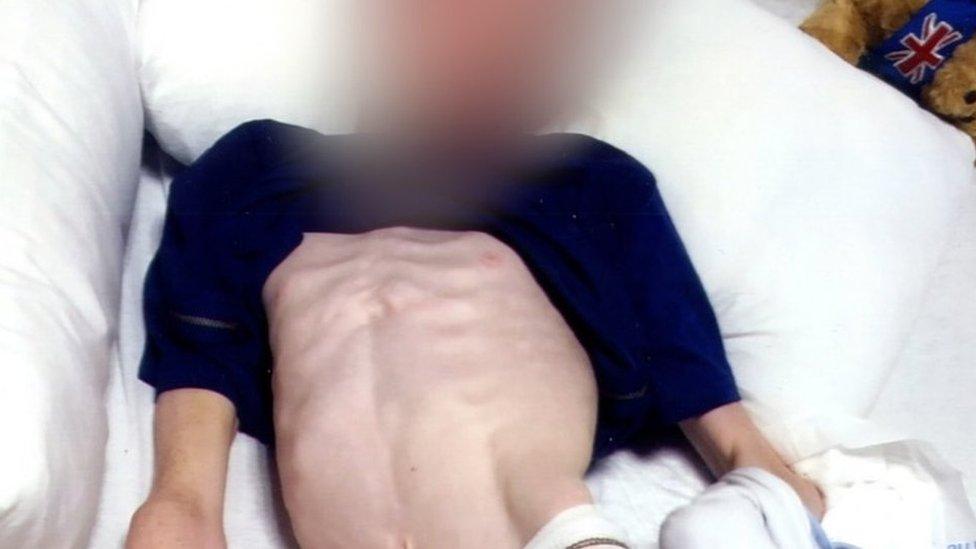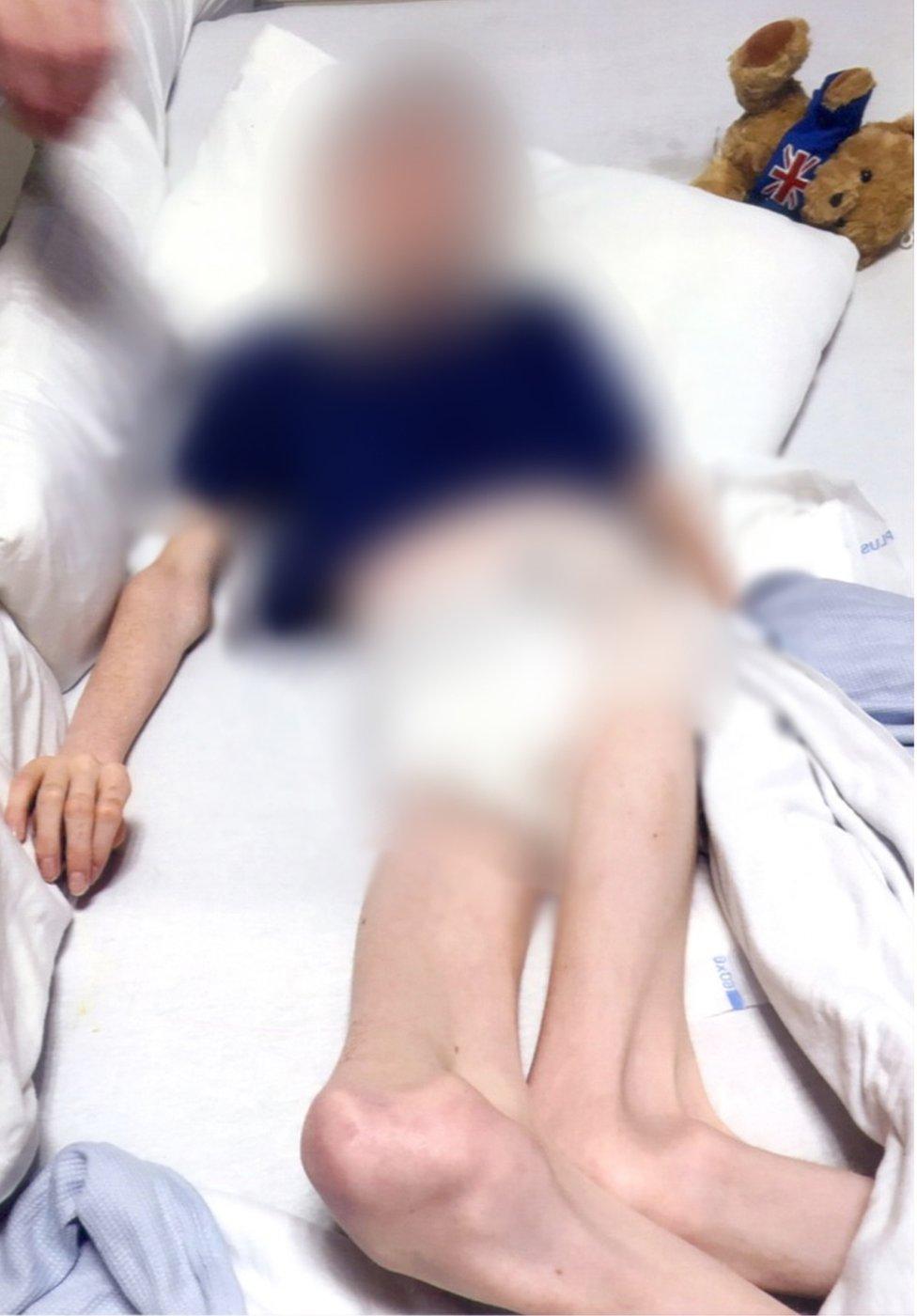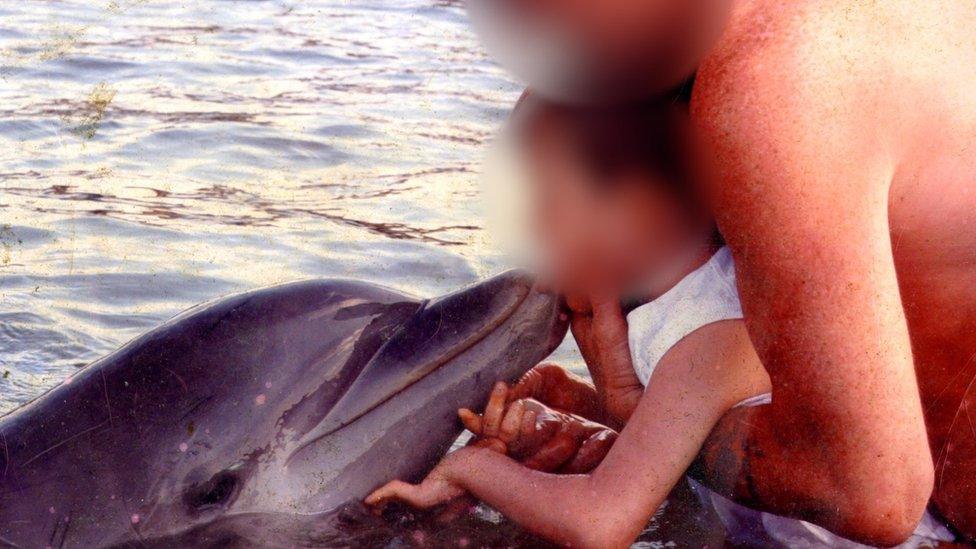Teenager in care almost starved to death
- Published

Malcolm suffered an "alarming weight loss" after he was taken into care, the sheriff said
A severely brain-damaged teenager who was in local authority care almost starved to death, a BBC Scotland investigation has found.
The 18-year-old weighed just over three and a half stones (23.1kg), was severely dehydrated and had sepsis.
His relatives claim they were told the young man, who cannot be named, was unlikely to survive.
The council responsible for his care said it "utterly rejects" any suggestion he was mistreated.
However earlier this year, in a guardianship case, a sheriff's judgement seen by the BBC said the young man had "suffered grievously" while in the overall care of North Lanarkshire Council's social work department in December 2016.
The sheriff said he had not been cared for adequately and suffered an "alarming weight loss" before being admitted to hospital.
In the opinion of the doctor treating him, he exhibited signs of having been "punched and deliberately struck".
Despite being aware of these failings, the sheriff appointed the council to be his legal guardian, saying that since his discharge from intensive care two years ago he had been "appropriately cared for".
The sheriff also said his father was no longer a suitable guardian.

Malcolm is unable to walk or feed himself
In his written judgement, the sheriff outlined how the young man, whose name we have changed to Malcolm, sustained a brain injury as a young child and had complex neurological difficulties which meant he could not walk or feed himself.
It said he had complex dietary requirements and lost weight easily.
The sheriff said Malcolm only weighed about 34kg to 36kg (between 5st 5lb and 5st 9lb) and eating adequately and regularly was very important.
His father Dave, not his real name, had looked after him full-time throughout his life but he became seriously ill in December 2016 and Malcolm was taken into the care of the council's social work department.
About two weeks later - just days after his 18th birthday - Malcolm's health had "deteriorated significantly" and he was admitted to an intensive care ward.
His father told the BBC: "The doctor said he wouldn't see it through the night. And he'd lost a hell of a lot of weight. He couldn't hold his head up.
"When you look at the photographs, he should have been taken to hospital right away."

Malcolm suffered an "alarming weight loss" after he was taken into care, the sheriff said

North Lanarkshire Council denies any mistreatment of Malcolm while he was in its care.
The BBC understands the case was not referred to the police and there was no investigation.
Child protection expert Tam Baillie said: "Whoever comes across a child who is at risk or there is evidence of abuse or neglect should contact either social work or the police."
Mr Baillie, the vice chairman of Child Protection Committees Scotland, said: "Where there is evidence of abuse or neglect then the police should always be involved at the earliest opportunity. That goes for not just children but for adults as well."
'Additional challenges'
He said there were vulnerable groups, such as children with learning or communication disabilities, who were more susceptible to neglect and abuse.
Mr Baillie said: "We have to pay close attention to those children. These are additional challenges as well as making sure children are safe in whatever environment they are staying in."
Malcolm was discharged from hospital in February 2017 and was moved to a different care setting where he was said to have "thrived".
In October that year he was returned to the family home, with 24-hour assistance.
His father's health had improved but he had been left with "significant disability" and was unable to care for Malcolm without help.
However, the sheriff heard that the father's behaviour with care staff meant that carers refused to visit and Malcolm was removed from the family home.

Malcolm was cared for by his father and went on holidays to America and the west coast of Scotland
The sheriff said he believed Malcolm's health had improved in a new care home and that his father would not co-operate with social workers and carers, potentially putting his son at risk.
In February, the sheriff appointed the council as Malcolm's long-term legal guardians.
He said father and son had a "close and loving" relationship but since his illness Dave had been "aggressive" and "abusive" towards carers and social work staff, and was not a suitable guardian.
Dave denied these allegations.
Malcolm has been living in accommodation with 24-hour support since the end of 2018.
His father and the council have been unable to agree on arrangements for him to see his son.
'Very overpowering'
Dave is worried he will never see Malcolm again and is desperate to bring him home.
"I can't put words to it," he said.
"It's very overpowering. He knows what home is. He does feel home, he knows home. I can't cry any more. I've cried so many times, and I've felt so weak.
"He's always been at my side 24 hours a day. I gave my whole life up to my son, because he needs it. And I enjoy sharing it with him. I enjoy sharing every single day."
Alex Neil, the SNP MSP for Airdrie and Shotts, has been involved with the family and the care of the boy for the past 12 years.
He said: "I don't believe the council should have care because the last time he was in the care of the council he ended up at death's door."
'Highest standards'
Mr Neil said the council had barred him from going to see Malcolm.
He said: "The council used their powers in a dictatorial way to stop people like me checking on my constituent and I think that is totally outrageous and unacceptable.
"They see it as a power struggle between them and the family. That's not how these things should work. The only thing that should matter in this case are the interests of this young boy."
In a statement North Lanarkshire Council said: "We utterly reject any suggestion that the individual was in any way mistreated while in our care. The sheriff had full access to all the relevant background information. He determined that North Lanarkshire Council should replace the individual's father as the appropriate Welfare Guardian.
"We will continue to provide everyone placed in our care with the highest standards of support and attention."